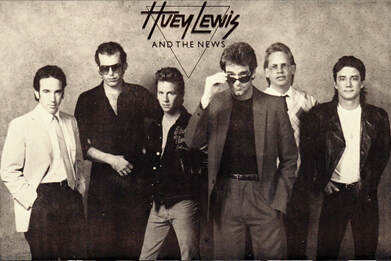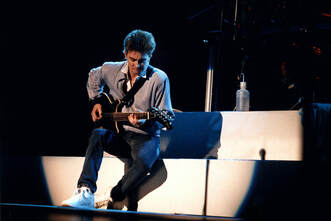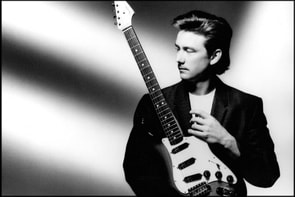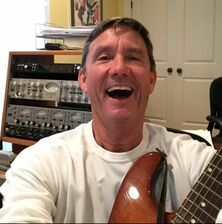
Cris Cohen: What stands out in your mind when you think back to your time in Huey Lewis & The News?
Chris Hayes: We had a lot of good times together. It is kind of like being in a family, an extended family kind of situation. When we started out, I didn't really think we were going to be super huge and famous. It was more like, okay, we got a band. But looking back on it... like that "We Are the World" session for example. That was really an incredible moment in time. If you had told me when I was graduating from high school that eventually I would do a recording with those people, I would have laughed in your face. I would have said, "There is no way that is going to happen." Those really were some incredible moments. Getting nominated for an Oscar was a big deal for me. I had no idea that was ever going to happen. Challenging Songs Cris Cohen: From a music perspective, what was one of the more challenging Huey Lewis and The News songs to record? Chris Hayes: I remember going over one of the a cappellas that we did. I think it was "Naturally." I remember that as being difficult. That wasn't one that just went right down on the tape. It took a while to get that right. I remember "Do You Believe in Love" being a little tough, because it was in B. But then other ones like "Workin' for a Livin'" and "Couple Days Off," those were a lot of fun. "Small World" too. But mostly the singing was the hardest part. Because it is hard to make background vocals sound great. In those days, we had to sing all of them. Nowadays, you do it once on your computer and you copy it. Cris Cohen: And there was no Auto-Tune back then. Chris Hayes: No. There was no Auto-Tune. We were Auto-Tune. And you have to get every guy's singing on pitch and in rhythm at the same time on tape without laughing or something. It's a challenge. 
Guitar Solos
Cris Cohen: What makes for a good guitar solo? Chris Hayes: I think having some sort of theme is always good, and being able to have something in there that is easily whistled or hummed. Something kind of catchy. Not too complicated. Not super technical. Try to be a little bit more melodic. Try to have a hook of some kind. I'm not the greatest technical player in the world, but I tried to do something melodic in there so that people would recognize it. Something recognizable is probably the most important thing. Cris Cohen: Johnny Colla said that one of the reasons your solos were different from everything else on the radio at the time was because of your jazz background. I'm curious how much of your solo writing was different on purpose, and how much of it was just because you couldn't help it, because you were so inundated with the world of jazz when you came into this? Chris Hayes: I came up in that. I learned playing all those standards out of the book and playing a lot of funk, and not really playing a lot of rock. I had to kind of learn that. So I'm kind of more of a funk player. I never considered myself a great jazz guitar player or anything, but that's kind of how I learned. So I possessed certain parts of the lexicon. I sort of speak that language a little bit. So naturally it is going to have an influence on the note choices that I would make. That is what I would gravitate towards. If I had been a devotee of Jimi Hendrix or a blues guy, it would have been a completely different thing. If I had been some sort of technical, Eric Johnson-type guy -- he's fantastic -- if that was the kind of stuff that I liked to play, then it would be more like that. Cris Cohen: Everyone has kind of their own voice on their instrument... Chris Hayes: I think so. That is the way I look at it. That is why music is so cool. Because regardless of your technical level, there is a certain amount of expression that goes into it. There are varying levels of technicality. And sometimes being perfect isn't necessarily the best thing, because none of us are really perfect. It is kind of more human almost in a way to have the flaws in there. That is my excuse for not playing better, anyway. Cris Cohen: What's the old saying with live performances… if you make a mistake, do it a second time. Then everyone will think you did it on purpose. Chris Hayes: Exactly. The whole thing goes by so fast, it is like nobody even notices. 
Cris Cohen: And then staying on the idea of the solo, there is some cool concert footage out there of you doing these extended solos / intros to "I Want a New Drug.” How did you develop that?
Chris Hayes: I used play with this band called the Ellis Liebman Band with Dave Liebman and Pee Wee Ellis. There is a long tradition in jazz of doing solos with just drums. If you listen to like Elvin Jones “Live At The Lighthouse”… just drums and saxophone. A soloist and a drummer. So, we started doing that as an intro for that song. I think it was a good time for everybody to take a break. I'm sure they were backstage making fun of me, or doing whatever it is that they needed to do to get ready to do the last song. Because traditionally we did that as the last song in the set. Bill would just start with a kick drum, lay down the four beats, and I would try to jam a little bit. Sometimes the solos were really good, and then other times they were less good, but it was always fun. I tried to do different things and use different modalities and scales. It was actually a great thing for me to be able to do, and I was glad Huey let me do it, because with most bands you might not get to do that. Cris Cohen: So basically it sounds like you had kind of an overall skeletal structure to it, but within that, there was some room to play and improvise every night? Chris Hayes: Yes. And the nice thing about just having two instruments is there is a lot more freedom in terms of harmonic content. You can play whatever you want. There is nobody playing any chords underneath you. You can try some different things. I enjoyed it. Cris Cohen: A lot has been written about how your jazz background influenced your playing in this rock arena, but I'm curious how your experience in the world of rock influenced your playing? Chris Hayes: It certainly gives you a better sense of how to entertain people. Not that I am some sort of compelling performer, but I am probably a better performer for having done that for 22 years. Now sometimes I will find myself jumping around on stage. Traditionally when you go see jazz guys, they don't jump around all that much. But from time to time I will do something like that. Watching His Son Learn Guitar Cris Cohen: I know that your son plays guitar. Watching him learn the guitar, how has that given you a different perspective on the instrument? Chris Hayes: It is interesting because he is learning it from a whole different direction and perspective than I did. When I was a kid, we learned how to play by playing with people and eventually playing in clubs. You did a lot of jam sessions. There were opportunities to go out and play that were pretty easy. We didn't have the internet, obviously. Nowadays, you can learn anything that you want on YouTube, from fixing a dishwasher to learning how to play Eric Johnson solos. He got into country music, which is a completely different animal than playing be-bop or funk. He is more of a country kind of guy, which is great. I was never really very good at that, so it's cool for me to watch how he approaches it. Because it's more of a lick-driven sort of thing. Cris Cohen: I found out that your son is a big Brad Paisley fan. Chris Hayes: Loves Brad Paisley, and Brad has been so great. He has been really cool to both of us, and we have been to a bunch of his shows. He is really a great guy and a great guitar player. Ben absolutely idolizes him… as do I. I think he is fantastic. He is a great performer and a great human being. Songwriting Cris Cohen: What is or was your songwriting process? Chris Hayes: A lot of times Huey would just give me a piece of paper with some lyrics on it. "Here. Write a song to this." That was the easiest thing to do. I was really into just writing songs, but I was kind of a little blocked on the lyrics side. Huey really preferred to write the lyrics himself anyway, which I totally get and he was better at it. Maybe he would give me just one verse and one chorus, so I could get sort of the pentameter of it. Those twenty years I was really into just coming up with music. It was flowing through me. So sometimes I would bring songs to him and go, "Hey, this is something I've been working on. Can you write some lyrics to this?" That was harder, because he had to come up with lyrics to my music and melody. That is a lot more difficult than writing the song to lyrics that have already been written. Because music has its own higher emotion than words do. Words are powerful, but music is emotionally powerful, and it is hard to come up with something that is not corny to fit the emotion of a musical passage. That is hard work, but he did it. I'm proud of him. He did it well. Cris Cohen: How would you say your songwriting changed from album to album? Chris Hayes: When I first got into the band, they had a couple of songs that they were working on, and I said, "Well, I like to write songs too. Can I write some?" And they were like, "Sure, of course." So I came up with a couple things, and then we ended up using a couple of them on the first album. I think we used three songs, which was cool for me. The first stuff that I wrote for the band had a New Wavy kind of vibe, because that is kind of what we were doing on that first record. It was more of a New Wavy kind of record. The second album was more of a pop kind of thing, except for "Workin for a Livin," which was kind of almost a country tune. It has been covered by three country artists, so that's kind of interesting. The lyrics are so every man. By that time, we weren't really New Wavy anymore. We got "Do You Believe in Love" on the radio, and that helped us. Once we did that, then we went out and just played a bunch. When we started working on "Sports,” I think we got really lucky, because "Heart and Soul" was a huge hit. "I Want a New Drug" and "If This Is It." "If This Is It" is a pretty well-crafted pop song. "The Heart of Rock and Roll." Those were pretty compelling album tracks. There were a lot of different things on that record that ended up being bigger than I would have thought. When we were making "Fore!", we were into the record and we still didn't really have a whole bunch of hits. Bob Brown (the band’s manager) said, "Hayes, I need a hit out of you." So I got myself a six-pack of beer, went back to my house, and just threw down "Stuck With You." Not the lyric part of it, just the music. I brought it to Huey, and he came up with the words for it. A New Purpose Cris Cohen: In other interviews you spoke of taking a hiatus from music. What did that entail and what was the reason behind that? Chris Hayes: I kind of just got into hanging out and watching my kids grow up. Music becomes like a lifestyle for musicians. It is like an identity and a lifestyle. Sometimes that identity or lifestyle may conflict with other stuff happening in your life, and for me I think that was it. Now I am just Sara, Ben, and Nick’s dad. Sometimes your purpose changes. It is all good stuff. I am just happy that I had the life that I had with the band. It was a lot of fun. I really enjoyed it and I learned a lot. I'm just really thankful that I was able to experience the things that I was able to experience.
Get notified of new interviews...
Comments are closed.
|
Never miss an interview or eBook release
See the full list of Bands To Fans interviews
Learn how we can develop custom content for your band or business
|

 RSS Feed
RSS Feed